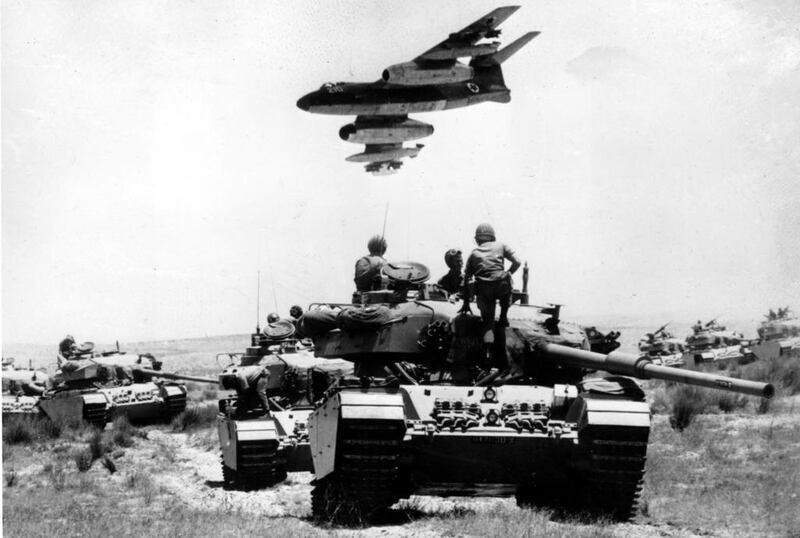Forty-eight years ago this week, a short war took place along the Mediterranean, the repercussions of which still shape the Middle East.
Indeed, the 1967 war between Israel and Egypt, Syria, Iraq and Jordan has, to a greater or lesser extent, defined the relationship between those countries and the rest of the world. It was in that conflict that the seeds of many of the troubles of the region today were sown: the occupation of the West Bank and Gaza; the semi-permanent state of emergency in Egypt; the beginning of the Assad dynasty in Syria.
The war of 1967 is, therefore, still very much with the Middle East – not least because of its effect on a generation of Arab and Israeli politicians.
Yet the challenges the Arab world faces today are greater than those of 1967. Many of the pressures that had steadily built-up since the end of the Ottoman Empire – and were exacerbated by the 1967 war and its aftermath – have now reached a climax in the total destruction of the functioning of two nation states, Iraq and Syria.
The period after 1967 provoked immense political and philosophical debate across the Arab world. The period after this one will do the same. What lessons, then, can 1967 offer to the current upheaval in the Middle East?
______________________________________________________________
Read and watch more analysis from Faisal Al Yafai:
■ A new McCarthyism has reached the Middle East
■ The Middle East's new world order
______________________________________________________________
The first is that the military offers only a temporary solution. Neither Israel nor Egypt nor Syria were minded to make peace directly after 1967. Israel had long wanted the West Bank and particularly East Jerusalem and had no intention of handing them back to the Palestinians. The Arab countries were bruised by the battle and wanted to regain a military deterrent. In all cases, they spent years focused on external military threats, at the expense of internal politics and development.
There are, certainly, times when external threats require a military build-up. But that has to occur in tandem with the development of society and the economy. Focusing all of the energy of the country on defence of the homeland does not, in the long run, bring stability. That particularly applies in a globalised age – an economy strongly linked with the outside world provides better security than seeking internal self-sufficiency (as, for example, Syria tried under Hafez Al Assad).
The second is that stability is not an end in itself. Rebuilding a country is to some degree like rebuilding a political party – it is an attempt to find a new political project.
That is what needs to happen after the chaos currently occurring in the Middle East is resolved. Stability must first be returned to Yemen, to Syria and to Iraq.
But stability is not a political project; it is merely the basis for advancement. Once stability is re-established, the job of the cities of Baghdad, Damascus and Sanaa (and potentially Erbil and Aden) will be to figure out their role in a new Middle East.
That is why the non-Arab countries of the region – particularly Iran and Israel – must play a productive role in the future of the Middle East.
Israel, after 1967 and indeed before, was never a supporter of its neighbours, always a spoiler. Rather than recognise that a vibrant, secure Middle East would be to the benefit of all, Israel’s leaders sought to create security only in Israel by destabilising neighbouring countries. The result was security in neither. None of the countries in the Eastern Mediterranean, with the possible exception of Turkey, are secure and prosperous.
The same applies to Iran. If and when the Iranians conclude a nuclear deal with the West, the suspicion in the rest of the Middle East is that they will use their increased financial and political latitude to continue meddling in the affairs of their neighbours. I sincerely hope this view is wrong. After the deal is concluded, Tehran must recognise its future lies in a stable, secure Middle East. It must not make the same mistake Israel did after 1967 and seek stability within its own borders by fomenting chaos beyond them.
The last lesson is related to the second: that asking questions about the political direction of a country is not to be feared.
The hardest part once there is stability in the Middle East will be to push back against the voices of those who say that there should be only stability in the Middle East. Stability is the beginning – it is not the end.
In the aftermath of 1967, Egypt, particularly, was reluctant to allow the flowering of too much debate, lest it became criticism of the government.
But without dissent, without discussion, without engaging with even dangerous ideas like the redrawing of borders, the years that follow this period of chaos will only be the prelude to a longer period of stagnation. That is what happened in the decades after the 1967 war. The future of the Middle East is too important for it to happen again.
falyafai@thenational.ae
On Twitter: @FaisalAlYafai





